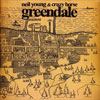NEIL YOUNG & CRAZY HORSE : GREENDALE
- Falling from Above
- Double E
- Devil's Sidewalk
- Leave the Driving
- Carmichael
- Bandit
- Grandpa's Interview
- Bringin' Down Dinner
- Sun Green
- Be the Rain
Label : Reprise Records
Time : 78:25
Release Year : 2003
Review (AllMusic) : Prior to its release, Greendale received more attention than any Neil Young album in years, but it wasn't positive. Young hauled out his concept album - about an extended family in a small town called Greendale, and how they're torn apart by a murder - to unsuspecting audiences, who by and large were not happy about spending anywhere from 55 to 85 dollars to hear a dense convoluted song cycle, complete with rambling narrative from Young, for the first hour of the show and not hearing many hits in the remainder of the set. Early in the summer of 2003, there was a brief blast of stories about this quasi-scandal, setting the stage for the late-summer release of the album: it got Young some needed press, and announced that unlike his last several albums, Young was actually trying this time around. Frankly, he needed a change. Ever since 1994's Sleeps With Angels - or, if you're less charitable, 1990's Ragged Glory - he had been drifting, playing with different groups, never quite mustering up enough energy to assemble a consistent set of songs whenever he headed into the studio. Here, the story and the setting give Young a hook for the record, a common theme that he can rally around, and the album benefits so much from that focus that it doesn't really matter that the story is convoluted beyond comprehension; the plot matters so much that it winds up not mattering at all. Close attention and repeated listens offer few rewards to the careful listener, because Young doesn't really say much of anything here, no matter how elaborately he says it. Learning more about the narrative - whether it's through the simultaneously released DVD of the Young-directed film Greendale, hearing his rambling on-stage between-song narratives, or reading apparent transcriptions of these ramblings in the liner notes - illuminates the story slightly, even as declarations like "When I was writing this I had no idea what I was doing, so I was just as surprised as you are" emphasize the suspicion that there's not much meaning in the whole enterprise.
